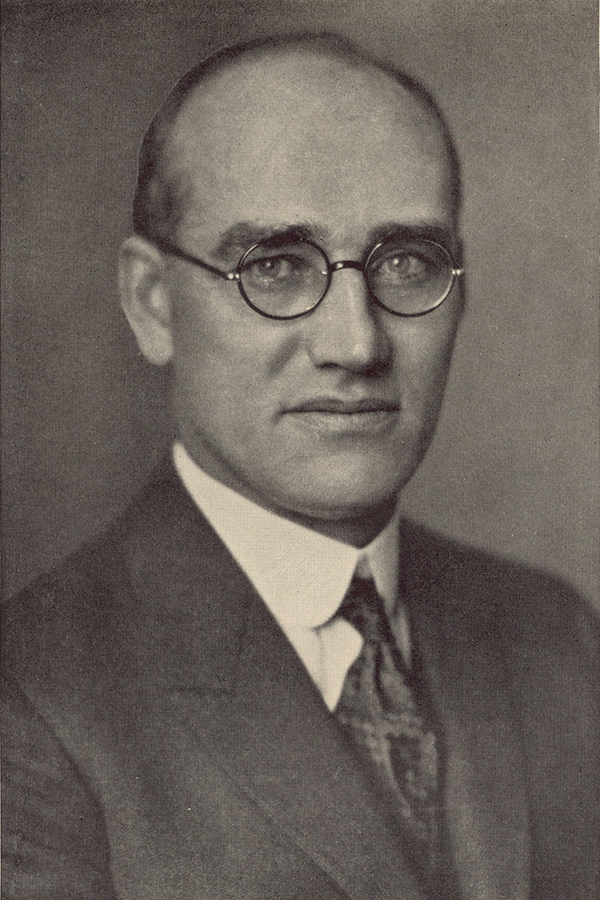William A. Comstock
William A. Comstock, Xi, 1899, Phi Alpha 1908-1909
 William A. Comstock,(July 2, 1877-June 16, 1949) Xi, 1899, Phi Alpha 1908-1909, was a prominent elected official and civic leader in Michigan, who established a successful business career, with holdings in real estate, banking and railroad construction. He was a dominant leader and visionary within Zeta Psi during his lifetime.
William A. Comstock,(July 2, 1877-June 16, 1949) Xi, 1899, Phi Alpha 1908-1909, was a prominent elected official and civic leader in Michigan, who established a successful business career, with holdings in real estate, banking and railroad construction. He was a dominant leader and visionary within Zeta Psi during his lifetime.
Comstock entered politics in 1911, serving as the Democratic country chairman. He served as an alderman in Alpena, his hometown, from 1911 to 1912, as mayor of Alpena from 1913 to 1914, and served on the board of regents of the University of Michigan from 1914 to 1916. He also served as chairman of the Democratic State Party from 1920 to 1924 and was a member of the Democratic National Committee from 1924 to 1930. After three unsuccessful bids for the governorship, Brother Comstock was finally elected governor in 1932. During his tenure as Governor, the state’s first sales tax was authorized; an old age pension system was initiated, but later failed; a trust commission was established; and an eight-day bank holiday was affirmed, which later led to President Franklin D. Roosevelt announcing a national holiday. After running unsuccessfully for reelection, he left office on January 1, 1935. Comstock continued to stay politically active as a member of the Michigan Civil Service Committee from 1939 to 1940. He also served as a member of the Detroit City Council from 1942 to 1949.
When the Brother Comstock became Phi Alpha he proceeded to discover all he could
about the challenges he faced. He discovered more or less an inchoate organization,
bound together with mystic ties; but, not a very tangible national organization. He found
when a neophyte joined the Fraternity, he joined his own chapter and took only a
secondary pride in the overall organization. Personal inter-chapter contact was almost
negligible in number. As Phi Alpha, Brother Comstock took the yeoman assignment of
visiting 19 of the 23 chapters of the Fraternity. At the 1909 convention, he reported on the results of his visits, a report that became to be known as “the Vision of Bill Comstock.” This report directly led to the formation of the Central Office (was first set up at the Xi chapter house at the University of Michigan and later moved to Chicago), and eventual move to New York City, elder chapters and their representation (as voting members) at Grand Chapter Conventions. and the publishing of a Fraternity magazine, The Circle of Zeta Psi, for which he provided
the funds for until it was recognized as the official organ of the Fraternity.
From the Zeta Psi Double Diamond Jubilee Book, 1997, “The Vision of Bill Comstock, was a statement of aspirations, it was evanescent, but it begot more detailed dreams, and those dreams begot inspiration, and the inspiration begot loyal devotion, and the loyal devotion brought into being what we have today as the central organization of the Zeta Psi Fraternity of North America”
After his term as Phi Alpha ended in 1909, Brother Comstock succeeded Israel E. Pierson, Phi, 1865, as Delta Alpha. He was instrumental in raising funds for the Alpha Epsilon (University of Illinois), Epsilon (Brown) and Xi (University of Michigan) chapter houses.
He is the namesake of The Comstock Trophy, given annually to the chapter “that best represents the Vision of Bill Comstock.” In 1958, he was posthumously awarded Zeta Psi’s highest honor, The Distinguished Service Award, one of only a few Brothers to be honored with this award after his passing.
